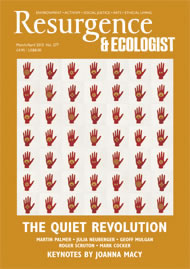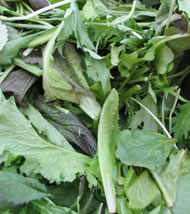I recently watched a wonderful television programme celebrating the life of the food writer and historian Dorothy Hartley and in particular her remarkable book Food in England. It’s a book that has long been on my own shelves and has been an inspiration in my own food writing, having been passed on to me by my mother when I was researching recipes for one of my books.
One of the people interviewed during this programme was the chef and food writer Rowley Leigh of Le Café Anglais in London. He was talking about Hartley’s natural sense of seasonality, and how the activity of her kitchen was based around the seasons and how important this was. He went on to say that to eat food in season was to be at one with the natural order of things. His description of the asparagus season, the time of year when the sap is rising and the young shoots of the asparagus burst out of the ground, was simply to underline a real sense of being.
In his book No Place Like Home, Leigh sets out this theme and arranges his recipes in seasonal order. We still want stews in winter and grills and salads in summer, but there is more to it than that. As the world gets smaller and markets become more international, there is a danger that everything we eat becomes standardised, boring and ultimately tasteless.
It seems to me that we must buy seasonal food from small producers if we care even remotely about the quality of what we eat. The arrival of foods in their proper season is the spur that revives and stimulates our pleasure in cooking and eating. I can remember arriving as a trainee chef at the Savoy Hotel in London in summer and enjoying making use of English strawberries, their flavour, colour and freshness. I was surprised that come October we were still getting strawberries although no longer from England, and horrified that in February they were being imported from across vast oceans.
Food had become a commodity and no longer represented where we were in any particular time of year. It still jars with me when friends proudly offer asparagus at Christmas time. We have lost our sense of place in the rich cycle that is life, and our sense of awe as the rich pattern of the seasons unfolds.
Today we are bombarded with television cooking programmes, which, because they are not demographic-specific, have no sense of seasonal place. The genuine excitement of fresh produce is replaced by the artificial adrenalin rush created by the drum rolls and extended silences before announcements as to who has won or got through to another round. It is not about the food: it has become pure entertainment, and pretty ephemeral entertainment at that.
Television has removed the human element of the thrill of the new and replaced it with an ersatz reality. Our natural instinct to take pleasure in the simple things in life is superseded by a manufactured need for instant gratification. Every gardener knows the pleasure of the first-picked broad bean or of plums in late August plucked straight from the tree. Every cook understands the pleasure of a shared experience and the simple act of giving. These are all essential human traits and I would argue essential to our wellbeing and as such to our very health.
The body is a self-regulating organism: it heals itself when cut or grazed, and when everything is in equilibrium it provides the signal to stop eating when we are full. But if something is out of kilter, the system begins to fail. Humans are part of the universe and we have our part to play, and part of that is to work with our natural surroundings and not against them. This is just obvious common sense and not based on some romantic notion of sustainability. To be at our best and to achieve our maximum potential, we need to have the best environment possible. This doesn’t just mean being surrounded by modern comforts: it means ensuring that everything we take in is of the finest natural quality.
If we work against the natural cycles of food, picking things unripe in order that they will ripen on the long journey to us, then that food will be nutritionally poorer. The more it dries out, the more the nutritional value declines.
The body’s natural ability to stop us eating is unbalanced when we eat poor-quality or processed foods. Our bodies are then confused and cannot work in their natural way. This can contribute to obesity, one of the great challenges facing us. The business of eating is seen by us less and less as a pleasure to be enjoyed together, and more as a solitary occupation to be got over with so we can get on with more interesting things (such as watching cooking programmes on TV). This in turn creates isolation and loneliness. Mental ill health is another major problem facing our society. Cooking and eating seasonal food is an important part of helping to prevent this.
Let us return again to working with our planet and our seasons. Not only is eating the right foods at the right time less expensive than eating imported and processed foods, but it also enhances our sense of place and participation. When we enjoy the wonderful crisp greens of spring with asparagus, young salads and peppery radish, we are celebrating all of life itself.
The profusion of wild fruits and blossoms in summer encourages our engagement with the outdoors. And good exercise, out of doors, is all part of what keeps our bodies ‘fit for purpose’. We can look forward to more celebrations when the harvest is brought in with a shared enjoyment of what we have. The days of the communal pig slaughter have long gone, but it is not too late to share and celebrate part of life’s rich pattern and enrich our lives through whole, fresh, seasonal food. I urge you to look to your gardens or veg boxes and seek out the small producers so that you too can cook, eat and live your life to the full.








